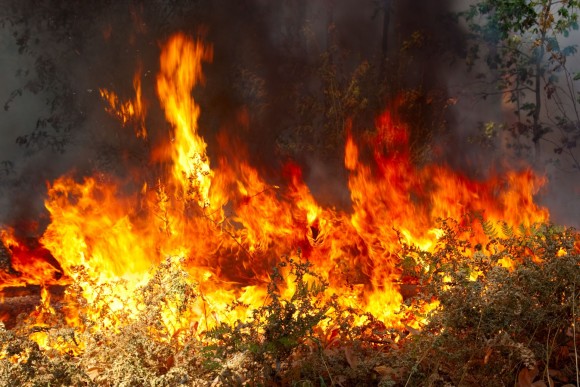Nearly 2 million homes, mostly in the Western U.S., with a rebuilding value of more than $638 billion are at an elevated risk of wildfire damage, a report out today shows.
An annual wildfire report from data provider CoreLogic comes amid historic blazes in the Pacific Northwest, and one of the worst wildfire seasons in California history still ongoing. CalFire’s latest report shows 3.75 million acres burned, and 7,874 structures destroyed. This year’s acres burned is 26 times higher than the acres burned in 2019, a relatively tame year for wildfires, for the same time period, according to CalFire.
CoreLogic examined the risk in 15 wildfire-prone states, where more than 1.9 million single-family residences are at an “elevated level” of risk. The reconstruction value of those homes is estimated to be roughly $638 billion.
The Western U.S. has a “disproportionate amount of wildfire activity,” the report notes.
California is home to 76% of the residences on the top 10 list, however but the reconstruction cost value of the homes comprise nearly 84% of the list.
The CoreLogic report shows the Los Angeles metro area tops the list of metropolitan areas with the greatest single-family residences at wildfire risk, with 154,462 homes with a reconstruction value of $90.31 billion.
That’s followed by the Riverside (126,628 homes) and San Diego (98,970 homes) metro areas. The other California cities atop the list were Sacramento, San Francisco and Truckee.
Austin Texas, where 73,756 homes with a reconstruction value of $22.67 billion, is No. 5 on the top 10 list. Denver, Colo. (55,762 homes), and San Antonio (41,299 homes) were also on the list.
Brekenridge, Colo., had the most multi-family residences at elevated risk, with 4,135 MFRs and a rebuild value of $1.06 billion.
COVID-19 hasn’t made things any easier.
The pandemic has created a shortage of contractors to conduct necessary structure and landscape mitigation, leaving high risk areas more vulnerable to wildfire damage, the report notes.
“The full impact of COVD 19 is still unknown, but there may be disruptions to the supply chain for raw materials, manufacturing and transportation, causing repair and rebuild efforts post-disaster to be especially challenging,” the report states. “Additionally, insurers may be challenged with an influx of claims and fewer adjusters to review damages.”
Related:
- Wildfire Forces Home, Hospital Evacuations in California’s Napa Valley Wine Area
- Wine ‘Smoke Taint’ Disputes Linger 2 Years After California Wildfires
Topics California Catastrophe Natural Disasters Wildfire Homeowners
Was this article valuable?
Here are more articles you may enjoy.



 USAA to Lay Off 220 Employees
USAA to Lay Off 220 Employees  Survey Shows Majority of Florida, California Homeowners Seeing Higher Insurance Costs
Survey Shows Majority of Florida, California Homeowners Seeing Higher Insurance Costs  Jury Awards $80M to 3 Former Zurich NA Employees for Wrongful Termination
Jury Awards $80M to 3 Former Zurich NA Employees for Wrongful Termination  AIG General Insurance Chairman McElroy to Retire May 1
AIG General Insurance Chairman McElroy to Retire May 1 

